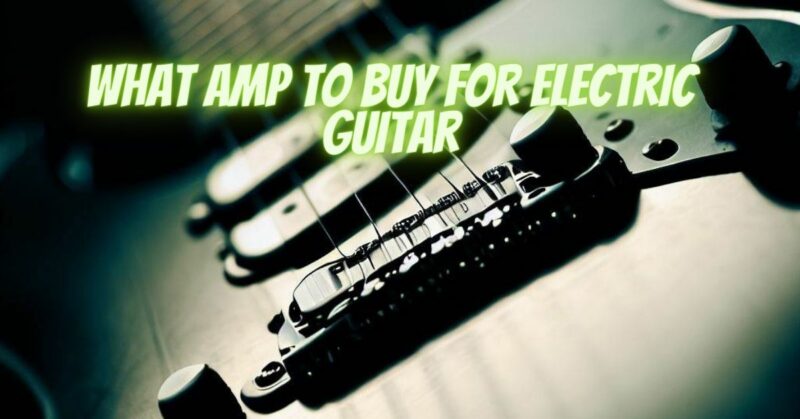Purchasing an amplifier for your electric guitar is a pivotal decision that directly affects your playing experience and tone. With a myriad of options available, finding the perfect amp can be both exciting and overwhelming. To help guide your choice, this article offers insights into the factors you should consider when buying an amplifier for your electric guitar.
Identify Your Needs:
Before diving into the world of amplifiers, it’s essential to understand your specific needs and preferences:
- Playing Style and Genre: Consider the type of music you play. Different genres demand distinct tonal characteristics, so choose an amp that complements your preferred style.
- Performance Context: Think about where you’ll be playing. If you’re primarily practicing at home, a smaller amp might suffice. For gigs and performances, you’ll likely need an amp with sufficient power to fill larger spaces.
- Tonal Preferences: Do you prefer warm, vintage tones or modern, high-gain sounds? Your tonal preferences will guide you toward the appropriate type of amp.
Types of Amplifiers:
There are several types of amplifiers available, each with its own sonic qualities:
- Tube Amplifiers: Known for their warmth and harmonic richness, tube amps produce that classic “amp warmth.” They often provide a dynamic response to your playing and are favored by many professionals.
- Solid-State Amplifiers: These amps use transistors and are known for their reliability and clean sound. They’re great for genres that require a pristine tone, and they often come with built-in effects.
- Modeling Amplifiers: Modeling amps use digital technology to replicate the sound of various amps and effects. They’re versatile and offer a wide range of tones, making them suitable for players who want flexibility.
- Hybrid Amplifiers: Combining tube and solid-state technologies, hybrid amps aim to deliver the best of both worlds: the warmth of tubes and the reliability of solid-state components.
Wattage Matters:
The wattage of an amplifier determines its power output and volume capabilities. Consider the wattage based on your usage:
- Low-Wattage Amps: These are perfect for practice and recording. They offer great tone at lower volumes, making them ideal for home use.
- Mid-Wattage Amps: Suitable for small to medium gigs, mid-wattage amps strike a balance between power and portability.
- High-Wattage Amps: For larger venues and stages, high-wattage amps provide the necessary volume. Keep in mind that higher wattage might be overkill for home use.
Features and Connectivity:
Consider the features and connectivity options that come with the amplifier:
- Effects: Some amps include built-in effects like reverb, delay, and modulation. If you’re just starting out, these features can be convenient, but more experienced players might prefer to use external pedals.
- EQ Controls: Look for amps with versatile EQ controls (bass, mid, treble) to fine-tune your tone.
- Inputs and Outputs: Check if the amp has multiple inputs for instruments and auxiliary devices. Additionally, outputs like headphone jacks and direct recording outputs can be beneficial.
Testing and Research:
- Try Before You Buy: Whenever possible, test the amplifier with your own guitar to hear how it responds to your playing style.
- Online Reviews: Read reviews and watch video demonstrations to gather insights from other musicians.
- Brand Reputation: Established brands often have a track record of producing quality amplifiers. Research the brand’s reputation before making a decision.
Selecting the right amplifier for your electric guitar is a personal and crucial decision that will impact your musical journey. By considering your playing style, genre, performance context, tonal preferences, and features, you can narrow down your choices and find an amplifier that complements your unique sound. Whether you’re drawn to the warmth of tube amps, the versatility of modeling amps, or the reliability of solid-state amps, the perfect amp is out there waiting to enhance your musical expression.


